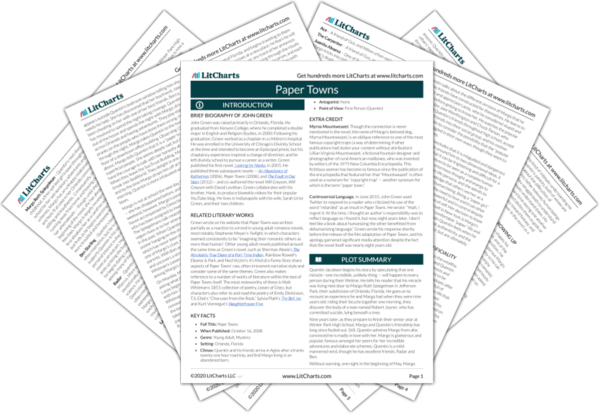Summary
Analysis
Quentin spends Monday afternoon reading Whitman. He begins listening to the same album of Woody Guthrie covers he discovered in Margo’s room, and spends the rest of the evening listening to her favorite music.
Quentin wants to experience the world the way Margo did. Immersing himself in the music that was important to her is a way of accessing her mind.
Themes
During dinner, Quentin’s mother tells him about meeting Chuck’s mother, Betty Parson, the previous day. She tells Quentin that Chuck is going to the University of Georgia on a football scholarship. Quentin answers that Chuck is an asshole, and Mrs. Jacobsen tells him that he will eventually learn to see his peers as human beings who struggle and need to be cared for, just as he does. She tells Quentin that Chuck has learning difficulties, and that his going to college is a positive thing. Quentin insists he doesn’t care about Chuck.
Quentin has been learning how to be compassionate with his friends, but his mother challenges him, here, to expand that compassion to people who don’t seem sympathetic to him. Chuck has always seemed to Quentin like a caricature of a crude and stupid bully, but Mrs. Jacobsen promises Quentin that he will become more generous as he matures and learns how difficult life is for everybody.
Themes
Quentin’s father says working as a therapist has taught him that human beings “lack good mirrors,” meaning they have a hard time knowing how their behavior makes them appear to other people, and so can’t know what changes to that behavior will make their feelings easier for others to understand. Mrs. Jacobsen agrees, and adds that it can be difficult for a person to conceive of others as being human beings. It is easier to “idealize them as god or dismiss them as animals” than to acknowledge their complexity.
Quentin has spent weeks working to understand Margo, but his parents’ conversation raises the question of whether understanding is possible even in the best of circumstances. Mr. Jacobsen imagines people trying and failing to make themselves comprehensible to those around them. It seems possible that, even if Margo wanted Quentin to understand her, wouldn’t have known how to communicate with him in an effective way.
Themes
Listening to his parents’ conversation, it occurs to Quentin that he has never thought about Margo as a person — all his attempts to imagine her have failed to recognize that basic fact. He suddenly realizes how empty Margo must have felt, surrounded by people who admired her but who never acknowledged her as a human being with an inner life separate from the front everyone could see. He recognizes that Margo had a hand in her own dehumanization — that she not only allowed him to see her as a miracle rather than a girl, but encouraged him to do so.
Quentin’s revelation is the final blow to his false idea of Margo, and it also highlights the crucial importance of openness and honesty in life and relationships. Margo did not open herself to anyone in a way that would have allowed them to see her as human, and others were able to idealize her because they discouraged her from being honest with them. Fear of honesty made mutual recognition and human connection impossible.
Themes
Get the entire Paper Towns LitChart as a printable PDF.













